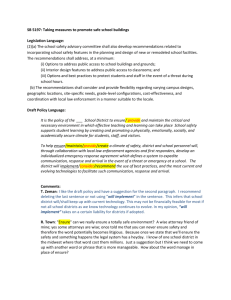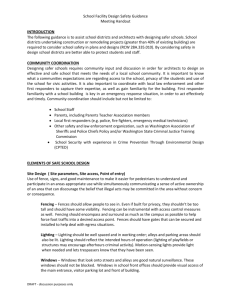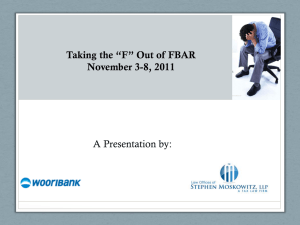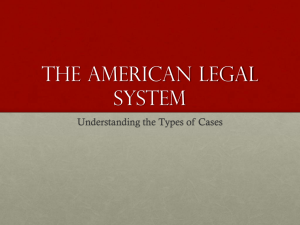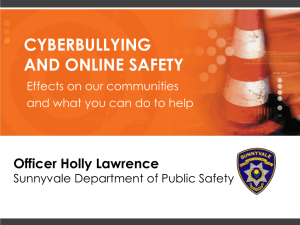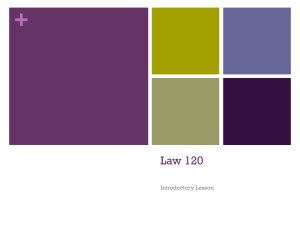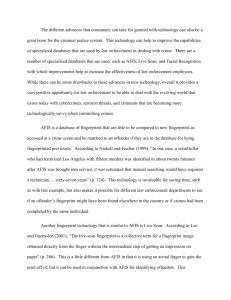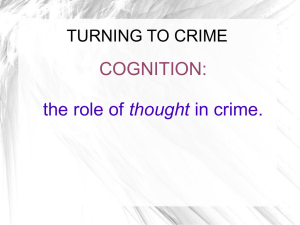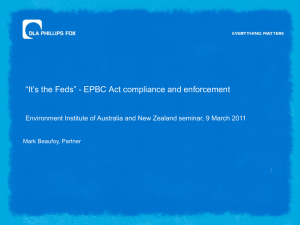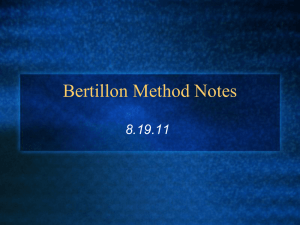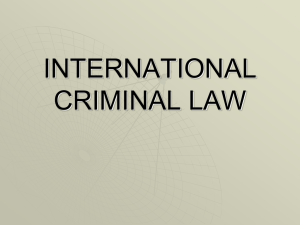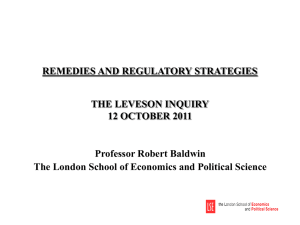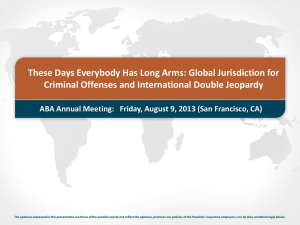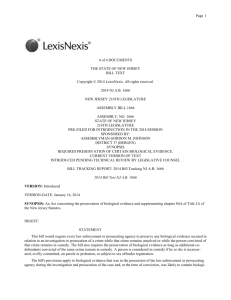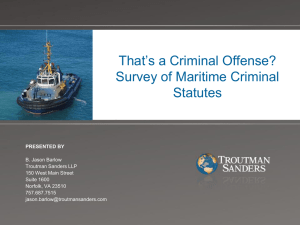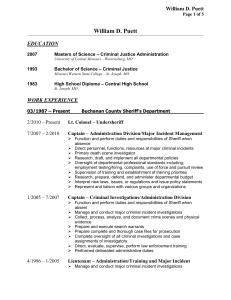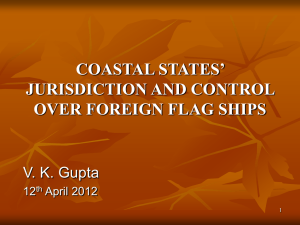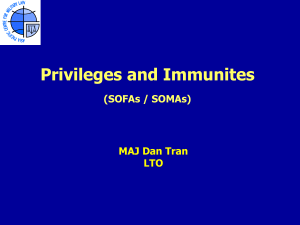ILPSCS Unit 3
advertisement
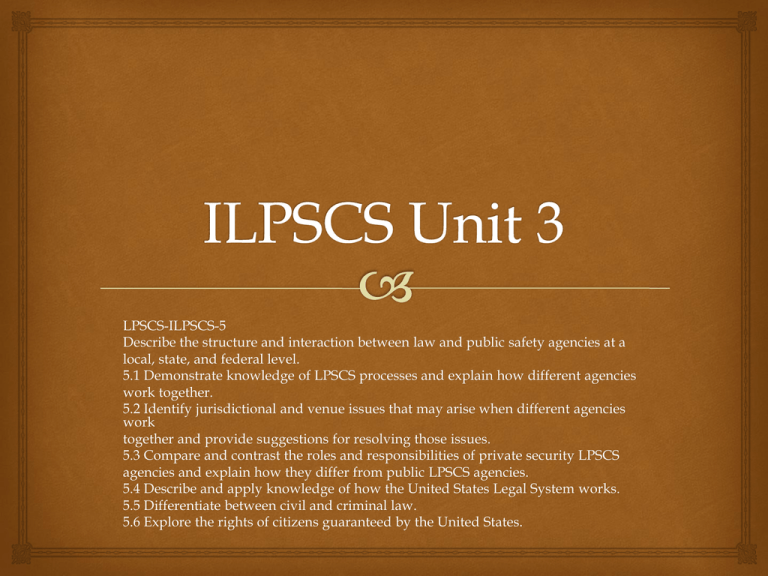
LPSCS-ILPSCS-5 Describe the structure and interaction between law and public safety agencies at a local, state, and federal level. 5.1 Demonstrate knowledge of LPSCS processes and explain how different agencies work together. 5.2 Identify jurisdictional and venue issues that may arise when different agencies work together and provide suggestions for resolving those issues. 5.3 Compare and contrast the roles and responsibilities of private security LPSCS agencies and explain how they differ from public LPSCS agencies. 5.4 Describe and apply knowledge of how the United States Legal System works. 5.5 Differentiate between civil and criminal law. 5.6 Explore the rights of citizens guaranteed by the United States. How does jurisdiction affect the actions of different agencies? Introduction: 1. Read Aloud Work: 1. Teach Jurisdictional and Venue Issues 2. Jurisdiction and Venue Activity 3. Unit 3 Paper Closing: 1. Answer EQ Levels of Crime Local Ordinances: Spitting on the sidewalk, Sleeping in the park, Noise Violations. State Crimes: Murder, Rape, Robbery, Assault, Drugs Federal Crimes: Tax Evasion, Drug Smuggling, Mail Fraud, Crimes across State Lines 3 levels of Law Enforcement Local: Smyrna PD, Cobb County PD State: Georgia State Police, GA DNR Federal: FBI, CIA, DHS Local LE Local State Federal LAWS! State LE Federal LE Local Law Enforcement Responsible for: 1. Enforcing Local Laws/Ordinances 2. Enforcing State Laws 3. Enforcing Federal Laws WITHIN THEIR JURISDICTION! State Law Enforcement Responsible for: 1. Enforcing State Laws 2. Enforcing Federal Laws WITHIN THEIR JURISDICTION! Federal Law Enforcement Responsible for: 1. Enforcing Federal Laws WITHIN THEIR JURISDICTION! Venue VENUE: where the crime occurred, where the crime is tried, and where the convicted are punished. The accused is charged where the crime occurred. The accused is tried where the crime occurred. (A change of venue can be requested) The convicted serves his/her sentence in the appropriate jurisdiction. What if the person runs? A warrant for their arrest will be placed on GCIC and NCIC. The next time that person is pulled over, applies for a job, or his/her name enters the system………POW! The law enforcement agency in that jurisdiction will make the arrest and EXTRADITE the accused to the appropriate VENUE. How do different law enforcement agencies work together? Introduction: 1. Read Aloud Work: 1. Teach the process of cooperation in LE 2. LE Process Worksheet 3. Unit 3 Paper Closing: 1. Answer EQ Working Together Local Law Enforcement enforces all laws. State Law Enforcement focuses on state laws/traffic. Federal Law Enforcement focuses on federal laws. EVERY AGENCY HAS THE AUTHORITY TO ENFORCE ANY LAW IF IT IS IN THEIR JURISIDICTION! Examples Local police report federal crimes to Federal Agencies. State Police assist local law enforcement in traffic enforcement. Federal Agencies use local resources to investigate federal crimes. How are public law enforcement agencies different from private security agencies? Introduction: 1. Read Aloud Work: 1. Teach public v. private LPSCS 2. Public/Private Ven Diagram Closing: 1. Answer EQ Public Law Enforcement Local, State, and Federal Agencies Enforce Criminal Laws Have the Authority to Arrest Follow the rules of jurisdiction Private Security Enforce private rules/regulations Have the authority to detain but not arrest Only have authority on the property they are assigned to. Focused on Civil Law What is the difference between criminal and civil law? Introduction: 1. Read Aloud Work: 1. Teach Criminal/Civil Law 2. Create a Criminal/Civil Law Comparison Chart Closing: 1. Answer EQ Criminal Law Criminal Law is violation of law that has been passed by legislatures and is enforced by government agencies(LOCAL, STATE, FEDERAL) Murder, Robbery, Arson, Theft, Forgery, Tax Evasion, Noise Ordinance Criminal Law Misdemeanors: Punishable by less than a year in jail. City County Felonies: Punishable by a year or more in prison. State Federal Civil Law Civil Law covers wrongs amongst individual citizens that aren’t covered by criminal law. Also known as TORTS Divorce, Contracts, Wills, Slip and Fall (NEGLIGENCE) How does the Bill of Rights affect United States Citizens? Introduction: 1. Read Aloud Work: 1. Teach Constitution/Bill of Rights 2. Create a Constitutional Outline Closing: 1. Answer EQ U.S. Constitution Constitution was signed on Sept. 17, 1787, and ratified by June 21, 1788. Created a central government (Federal) Created smaller governments (State)

